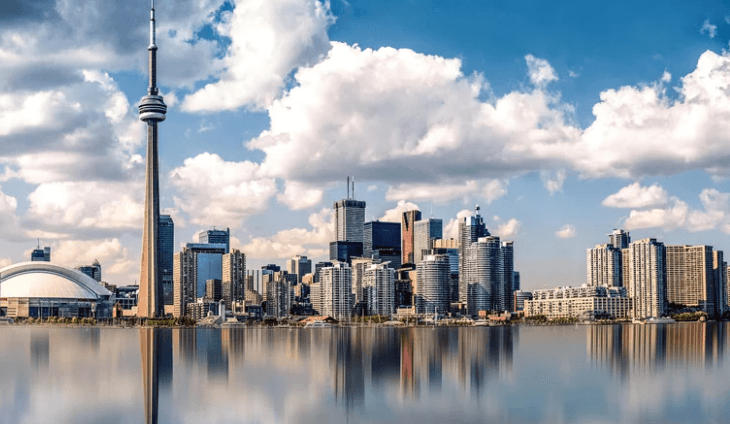Advertisements
Canada is renowned for its multiculturalism, universal healthcare, high-quality education, and strong economy. However, within this expansive nation, each city offers its unique blend of opportunities, lifestyle, and culture. The importance of selecting the right city for relocation cannot be overstated. It’s a decision that impacts every aspect of your life, from your career prospects and financial stability to your overall well-being and happiness.
This article will provide valuable insights and information to individuals considering relocation to Canada. By examining various factors, comparing cities, and highlighting their unique characteristics, we aim to assist you in making an informed decision about the best Canadian city for your relocation. Here are some of the top Canadian cities for relocation.
5 Best Cities to Relocate to in Canada
Toronto, Ontario
Toronto, Ontario, is a dynamic and multicultural city that offers a wealth of opportunities for individuals and families. The city’s healthcare system is excellent, and it’s known for its safe neighborhoods and low crime rates. Education options, from primary to post-secondary, are diverse and of high quality. Cultural amenities, from theaters and museums to music festivals, ensure that there’s always something to do. The city’s green spaces, such as High Park and Toronto Islands, provide recreational opportunities and a connection to nature.
The cost of living in Toronto can be relatively high, primarily due to housing costs. Rental prices for apartments and houses can be steep, although there is a wide range of options to choose from. Other expenses like groceries, transportation, and entertainment are also in line with the city’s status as a major urban center.
Toronto offers a wide range of job opportunities across various sectors. It’s the financial capital of Canada, housing the Toronto Stock Exchange and numerous financial institutions. The technology sector is also thriving, with a growing number of tech startups and multinational companies establishing their presence in the city. Additionally, healthcare, education, and manufacturing sectors provide ample employment opportunities.
Pros
- Toronto is Canada’s economic powerhouse, offering a wide range of job opportunities in various industries, including finance, technology, healthcare, and education.
- Toronto is one of the most multicultural cities in the world, with a vibrant and inclusive atmosphere, diverse neighborhoods, and a wide array of international cuisines.
- The city boasts world-class educational institutions and a robust healthcare system, making it an attractive destination for families.
- Toronto offers an abundance of cultural attractions, museums, theaters, and sports events. It’s also home to the iconic CN Tower.
- The city has an extensive public transportation system, including subways, buses, and streetcars, which makes getting around convenient.
Cons
- Toronto’s cost of living, particularly housing, can be high compared to other Canadian cities, which can be a challenge for newcomers.
- The city experiences traffic congestion, especially during rush hours, which can affect daily commutes.
- Winters in Toronto can be cold, with snow and ice, which might not suit everyone’s preferences.
Vancouver, British Columbia
Vancouver offers a diverse job market. The city is a major hub for the film and television industry, often referred to as “Hollywood North.” Additionally, the tech sector is booming, with numerous startups and established companies in the area. The natural resources industry, including forestry and mining, also contributes to the local economy. Tourism, healthcare, and education are other sectors with significant employment opportunities.
The cost of living in Vancouver, particularly housing, is notably high. Rental and real estate prices are among the highest in Canada, and finding affordable housing can be a challenge. Other expenses such as groceries, transportation, and entertainment are also relatively costly.
Advertisements
Vancouver consistently ranks high in terms of quality of life. The city offers excellent healthcare services, a well-regarded education system, and a variety of cultural and recreational activities. Residents can enjoy world-class dining, diverse cultural festivals, and an active outdoor lifestyle.
Pros
- Vancouver is renowned for its stunning natural scenery. Residents can enjoy beautiful beaches, lush parks, and outdoor activities year-round.
- Vancouver is one of Canada’s most ethnically diverse cities, offering a rich tapestry of cultures, cuisines, and festivals.
- The city’s economy is driven by sectors like technology, film, tourism, and natural resources, providing diverse job opportunities.
- Vancouverites enjoy a high quality of life with easy access to hiking, skiing, biking, and water sports, all within a short drive from the city.
Cons
- Vancouver consistently ranks as one of the most expensive cities to live in Canada, primarily due to skyrocketing housing prices.
- The city’s growing population has led to increased traffic congestion, especially during rush hours.
- While job opportunities are abundant, competition can be fierce, particularly in the tech sector.
Montreal, Quebec
Montreal is often cited as one of the more affordable Canadian cities. Housing costs, while rising, are generally lower than in cities like Toronto and Vancouver. Other expenses, such as groceries and transportation, are also reasonable. The affordability of Montreal is a significant draw for students, young professionals, and families.
Montreal has a diverse job market, with strengths in aerospace, technology, pharmaceuticals, finance, and film production. The city is home to several multinational companies and boasts a thriving startup ecosystem. Proficiency in both French and English can significantly expand job opportunities, although many international companies operate in English.
The city’s public healthcare system is well-regarded, and there are numerous world-class hospitals and universities. Residents can enjoy a rich cultural calendar, with events and festivals happening year-round. The city’s diverse neighborhoods cater to various lifestyles, whether you seek a quiet family-oriented area or a bustling urban environment.
Pros
- Montreal is known for its vibrant arts and culture scene. It hosts numerous festivals, museums, theaters, and a thriving music and nightlife scene.
- Montreal is bilingual, with both French and English spoken widely.
- Compared to some other major Canadian cities, the cost of living in Montreal is relatively lower, including housing costs.
- The city is home to several prestigious universities and colleges, making it an excellent choice for students.
Cons
- Montreal experiences cold and snowy winters, which can be challenging for those unaccustomed to such weather.
- Quebec has a distinct political climate, occasionally leading to tensions and debates about language and cultural issues.
Calgary, Alberta
Calgary is often considered Canada’s energy capital due to its strong presence in the oil and gas industry. However, the city’s economy has diversified in recent years, with a growing technology sector, finance, healthcare, and engineering. The job market in Calgary is competitive, but opportunities are abundant, especially for those with skills in demand in these sectors.
The cost of living in Calgary is generally moderate, particularly when compared to cities like Vancouver and Toronto. Housing costs are lower on average, and there is no provincial sales tax in Alberta, which can help with day-to-day expenses. However, it’s important to note that economic fluctuations can impact housing prices and job stability in the city.
The city’s proximity to the Rockies provides ample outdoor activities, including hiking, skiing, and mountain biking. Calgary’s parks, including Fish Creek Provincial Park and Nose Hill Park, offer green spaces for relaxation. The city also hosts cultural events, festivals, and a vibrant arts community.
Pros
- Calgary’s economy is driven by the energy sector, making it a hub for oil and gas companies.
- The city has a strong job market, particularly for professionals in engineering, finance, and technology fields.
- Situated near the Rocky Mountains, Calgary offers easy access to hiking, skiing, and other outdoor activities.
- Alberta has no provincial sales tax, which can translate into lower overall taxation compared to some other provinces.
Cons
- Calgary experiences a range of weather extremes, from very cold winters to hot summers.
- Calgary’s economy can be sensitive to fluctuations in oil prices, leading to periods of economic uncertainty.
- The real estate market in Calgary can be volatile, with housing prices and rents subject to fluctuations based on economic conditions.
Ottawa, Ontario
Ottawa, Ontario, is a city of political and economic stability, offering diverse job opportunities, a reasonable cost of living, and a high quality of life. Ottawa’s job market is heavily influenced by its status as the capital city. Government employment opportunities abound, including positions in public administration, policy development, and international affairs. The city is also a growing hub for the technology sector, with numerous tech companies and startups.
The city offers a safe and clean environment with access to quality healthcare and education. Residents can enjoy cultural activities, museums, galleries, and annual events such as Winterlude and Canada Day celebrations. Ottawa’s location along the Ottawa River provides ample outdoor activities, including hiking, cycling, and water sports.
The cost of living in Ottawa is moderate compared to some other major Canadian cities. While housing costs have risen in recent years, they are still more affordable than cities like Toronto and Vancouver. Other expenses, such as groceries and transportation, are reasonable.
Pros
- Ottawa is the capital city of Canada, which means it offers a stable political and economic environment.
- Ottawa is known for its high-quality education system, including top universities and excellent public schools.
- The city is consistently ranked as one of the safest and most livable cities globally. It offers a mix of urban amenities and natural beauty.
Cons
- Ottawa experiences cold winters with significant snowfall, which may not appeal to everyone.
- Ontario has relatively high taxes compared to some other provinces in Canada.
- While Ottawa has a vibrant cultural scene, it may not offer as extensive nightlife options as larger cities like Toronto or Montreal.
Conclusion
Choosing the right Canadian city for relocation is a significant decision that can shape your future and quality of life. Each of the cities we’ve explored offers its unique blend of opportunities and challenges.
In Toronto, you’ll find a bustling economic hub with a diverse culture, while Vancouver boasts stunning natural beauty and outdoor activities. Montreal is renowned for its rich culture and affordability, Calgary offers robust job opportunities and a lower cost of living, and Ottawa provides political and economic stability as the capital city.
Advertisements






